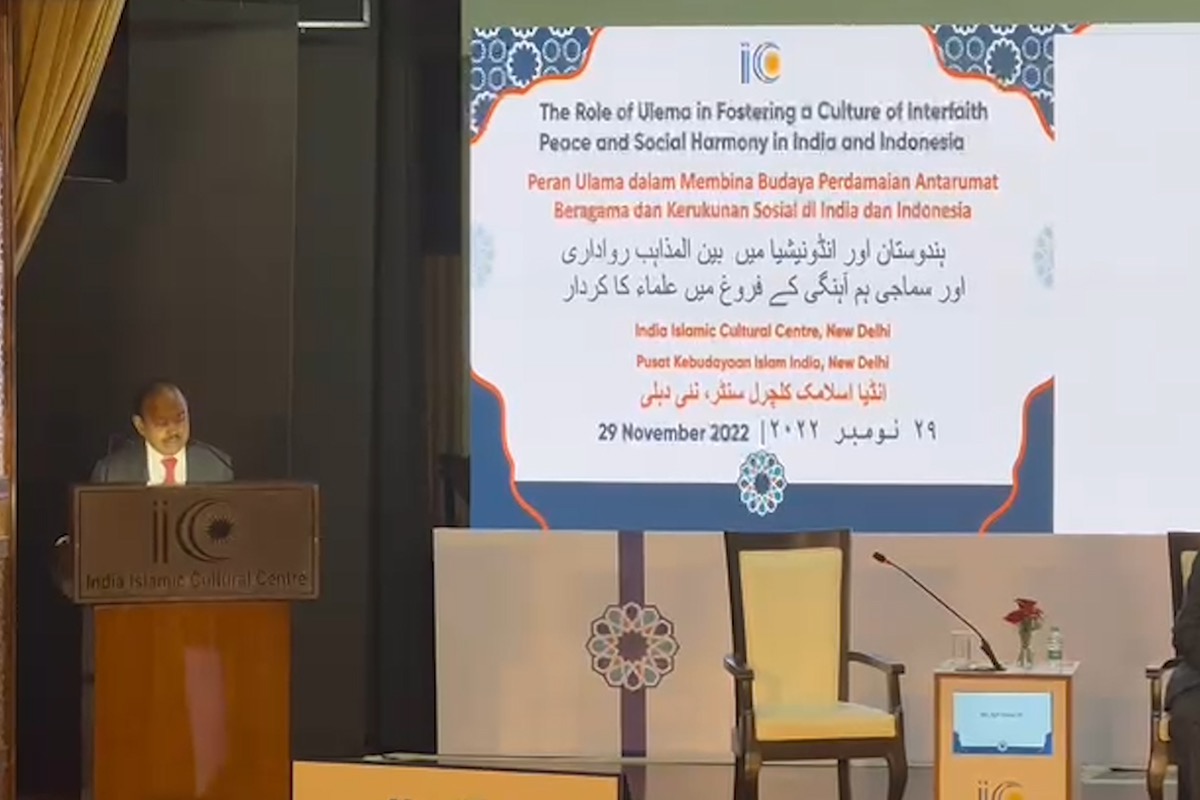Calling Islam the religion of peace, National Security Advisor Ajit Doval today highlighted the role that Ulemas, the learned interpreters and scholars of Islamic texts can play in countering elements of extremism and terrorism. “Extremism and terrorism is against the very meaning of Islam. Islam means peace and well being,” he said at the first Dialogue on Role of Ulema in fostering a Culture of Interfaith Peace and Social Harmony in India and Indonesia.
“The Ulemas have a leading role in educating the people on the original tolerant and moderate principles of Islam and countering radicalisation and extremism with progressive ideas and thought. Our youth should receive special attention towards this end. They are often the primary target of radicalisation, but if their energies are nurtured in the right direction, they can emerge as harbingers of change and building blocks of progress in any society,” he added.
Stating opposition to the forces should not be used to paint the religion as bad he said, “Instead we should focus on the real message of our religions which stand for the values of humanism, peace and understanding. As the holy Quran itself preaches, killing one person is like killing all of humanity. Islam ordained the best form of jihad is against ones ego and not innocent people.”
India’s NSA Ajit Doval hosts Indonesia’s Minister of security affairs Dr. Mohammed Mahfud, to discuss the
role of ulema in fostering culture of interfaith peace & social harmony.Indonesia has the largest Muslim population; India the 3rd largest Muslim population in the world. pic.twitter.com/VmUFNiU0OO
— Aarti Tikoo Singh (@AartiTikoo) November 29, 2022
He was speaking at the the first Dialogue on Role of Ulema in fostering a Culture of Interfaith Peace and Social Harmony in India and Indonesia at India Islamic Cultural Centre in New Delhi in the presence of Mohammad Mahfud Coordinating Minister for Political, Legal and Security Affairs of Indonesia. Doval and Mahfud inaugurated the session.
He emphasized the need to work together to develop common narratives on de- radicalization. In a democracy, there is no place for hate speech, prejudice, propaganda, demonization, violence, conflict and misuse of religion for narrow ends.
“Against the backdrop of tectonic shifts in the global order, India and Indonesia, given their rich history, diversity, shared traditions and Increasing bilateralism, have the potential to enhance prospects of peace, regional cooperation and prosperity in Asia,” he said.
India and Indonesia are home to the world’s largest Islamic populations, Indonesia is the world’s largest Islamic country and. India is home to the third largest Muslim population in the world.
Much like in India, Islam in Indonesia was spread by traders from present-day Kerala and Gujarat and Sufis from Bengal and Kashmir. “This peaceful spread led to the development of a syncretic culture, where not only pre-Islamic religions flourished side by side, but age-old traditions and local customs greatly Influenced religious practices,” Doval said.
It is significant that Islamic theological schools of Deobandi, Barelvi and Sufism took roots in India. Later, their practices and traditions spread to other Islamic nations.
“Both our countries have been victims of terrorism and separatism. While we have overcome the challenges to a considerable extent, the phenomenon of cross-border and ISIS inspired terrorist continues to pose a threat, Cooperation of the civil society is essential in countering the threat from ISIS inspired individual terror cells and returnees from theatres like Syria and Afghanistan,” he said.
Countries like India and Indonesia, with their experience of multi- faith harmony and co-existence, can send a joint message to the world to eschew violence and conflict. “This will be a powerful symbol of the determination of two large countries (together we have 1.7 Billion of the World population) to preserve and promote the true values espoused by religion,” he said.
Mahmud was accompanied by with five leading ulema from Indonesia. They are representatives of different Islamic organizations, namely Nahdatul Ulema, Muhammadiyah, Wahdah Islamiyah, and the Indonesian Ulema Council. These organizations are just some of the many Islamic organizations in Indonesia.
“Many times we have witnessed people who use their religion as a doctrine of absolute truth and readily blame others. We have to go out of this and improve. Religion, I think, should be a source of peace, not reason for discord, conflict, or violence. Religion should be a unifying tool, not as a divisive instrument,” he said.
They have been working for years through their books, articles, and preachings to promote tolerance, moderation, and peaceful co-existence. Mahfud said that he had read their works and personally invited them to come with him to India. They are Prof. Dr. Masykuri Abdillah (Nahdatul Ulama); Professor Dr. Abdul Mu’ti (Muhammadiyah); Dr. Mohammad Zaitun Rasmin (Wahdah Islamiyah); Dr. Abdul Mogsith Ghazali (Nahdatul Ulama); and Dr. M Cholil Nafis (Indonesian Ulema Council).
In Indonesia, together with the religious communities, the State also manages religious affairs. In the Ministry of Religious Affairs, officials from different faiths are appointed to oversee religious matters.










